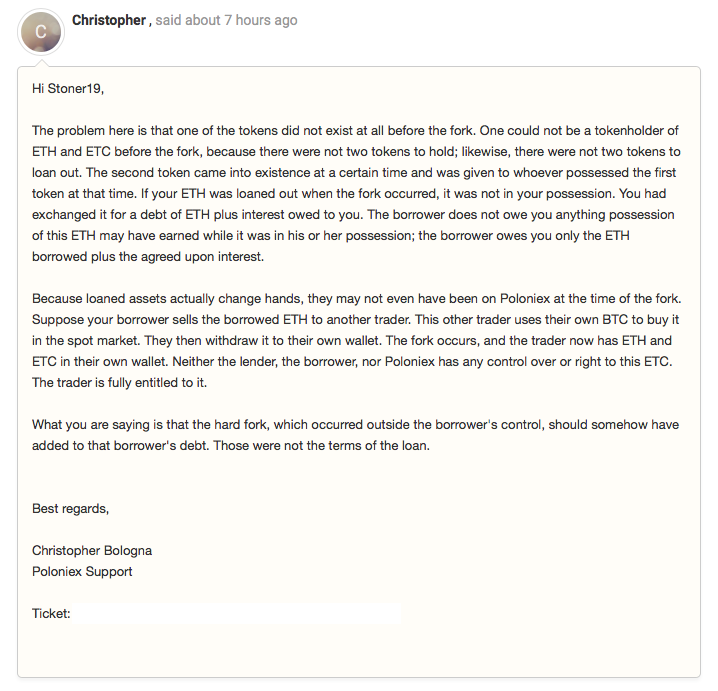I fully understand that for every ETH a user owned at the time of the hard fork @poloniex credited that user with an equal amount of ETC (Classic). The problem with this is they're looking at the user account snapshots at the time of the Hard Fork and not taking into consideration lending and margin trading. I have consistently been lending ETH for the last several months and because my ETH was being borrowed for Margin Trading at the time of the Hard Fork the user(s) borrowing my ETH were then credited with ETC.
Without a doubt, I still own those ETH. Due to forced liquidation it wouldn't be possible for a borrower to default on the ETH loans from me so I still own that ETH.
Shouldn't I have been the one to be credited with that ETC and not the borrower(s)?
It's very apparent that I'm not the only one questioning this. There are quite a few users showing up in the trollbox asking where they got this free ETC and stated that they didn't own any ETH.
Yes. Sounds like their staff is too lazy to code a solution for their users that does this (relatively simple) audit.
If they're telling you otherwise, there may be a fish fry in the workings ... probably during Lent.
This is fucked but lets be honest its not like we didnt expect it to happen. Poloniex and these other exchanges run by like 3 people imo shouldnt even be run at all. Its a cycle of them fucking up / going belly up and another shitty one taking over.
Well, I am grabbing the popcorn for this one.
I lost 200 etc due to me having lent my Eth out, yay polo..
I had a short open which I did not receive ETHC for - so I guess Poloniex still have those coins and may distribute them to lenders in the future.
Don't really want to enter too much into the debate, but I think it is an act of good gesture (hopefully it will do more right than wrong), they weren't really obliged to do anything... I mean bittrex, haven't done anything for that matter... (lol may-be I should check on poloniex, If I got some some ethc myself lol)
Same dilemma here ;-)
https://steemit.com/moon/@anuarku/really-piss-me-off-on-ethereum-classic-etc
Well, let's look at it from another perspective: If the ETH you lent out was shorted and someone thus actually bought the ETH from the shorter, it is rightfully his and he should get it. Therefore, if you argue that you should also get the ETC, then Poloniex either has to somehow duplicate the ETC for those ETH (not possible) or punish the shorter and make him also pay back your ETC, in addition to your ETH. I think that between the two choices, Poloniex chose the best one. Although I do understand that whatever option Poloniex would have chosen, one side would always feel robbed.
I think if Forced Liquidation weren't in place and borrowers could in fact default on a loan that could be arguable, but because of Forced Liquidation I will still get the ETH I own returned to me.
Yeah but then you argue that the forced liquidation should also force the shorter buy back the ETC from the market and give that to you? I think many shorters would really feel robbed if that were the case.
EDIT: One more thing: Forced Liquidation does not guarantee 100% that you get back your loan; it happens when polo "thinks" the user cannot pay off his loan. With the value of ETC not known at the time, it can also be argued that you actually lost part of your loan due to borrower default.
I opened a ticket at Poloniex to get more infomation about the ETC credits issued to users. Here is the reply I received from them:

(link here if you can't read the screenshot here is the link http://imgur.com/a/oMxPI and quote below)
The next question I've asked them is in regards to the lack of notice given to users. I most certainly would have stopped my lending scripts and turned off the "auto-renew" function for loans in hopes of at least getting some of the ETH back into my account prior to the hard fork.
I very well may be beating a dead horse at this point and maybe I am the one in the wrong, but I still don't feel like this whole process was handled properly nor professionally.